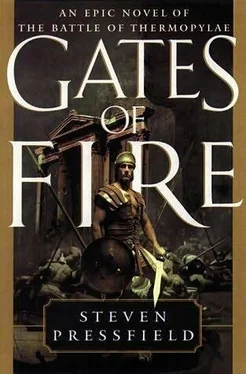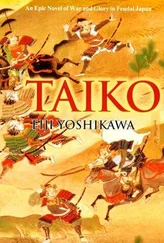Steven Pressfield - Gates of Fire - An Epic Novel of the Battle of Thermopylae
Здесь есть возможность читать онлайн «Steven Pressfield - Gates of Fire - An Epic Novel of the Battle of Thermopylae» весь текст электронной книги совершенно бесплатно (целиком полную версию без сокращений). В некоторых случаях можно слушать аудио, скачать через торрент в формате fb2 и присутствует краткое содержание. Жанр: Историческая проза, на английском языке. Описание произведения, (предисловие) а так же отзывы посетителей доступны на портале библиотеки ЛибКат.
- Название:Gates of Fire: An Epic Novel of the Battle of Thermopylae
- Автор:
- Жанр:
- Год:неизвестен
- ISBN:нет данных
- Рейтинг книги:3 / 5. Голосов: 1
-
Избранное:Добавить в избранное
- Отзывы:
-
Ваша оценка:
- 60
- 1
- 2
- 3
- 4
- 5
Gates of Fire: An Epic Novel of the Battle of Thermopylae: краткое содержание, описание и аннотация
Предлагаем к чтению аннотацию, описание, краткое содержание или предисловие (зависит от того, что написал сам автор книги «Gates of Fire: An Epic Novel of the Battle of Thermopylae»). Если вы не нашли необходимую информацию о книге — напишите в комментариях, мы постараемся отыскать её.
Gates of Fire: An Epic Novel of the Battle of Thermopylae — читать онлайн бесплатно полную книгу (весь текст) целиком
Ниже представлен текст книги, разбитый по страницам. Система сохранения места последней прочитанной страницы, позволяет с удобством читать онлайн бесплатно книгу «Gates of Fire: An Epic Novel of the Battle of Thermopylae», без необходимости каждый раз заново искать на чём Вы остановились. Поставьте закладку, и сможете в любой момент перейти на страницу, на которой закончили чтение.
Интервал:
Закладка:
Leonidas now strode forth to address the allies. He confirmed what each Hellenic warrior presumed by sight, that the division of the enemy now advancing into view was indeed Xerxes' own Immortals and that the number of their company, as nearly as could be estimated by eye, was the full ten thousand.
It would appear, gentlemen, Leonidas' voice ascended powerfully, that the prospect of facing the picked champions of alt Asia should daunt us. But I swear to you, this battle will prove the most dustless of all.
The king used the Greek word akoniti, whose application is customarily to wrestling, boxing and the pankration. When a victor overthrows his opponent so swiftly that the bout fails even to raise the dust of the arena, he is said to have triumphed akoniti, in a no-duster.
Listen, Leonidas proceeded, and I will tell you why. The troops Xerxes throws at us now are, for the first time, of actual Persian blood. Their commanders are the King's own kinsmen; he has brothers out there, and cousins and uncles and lovers, officers of his own line whose lives are precious to him beyond price. Do you see him up there, upon his throne? The nations he has sent against us so far have been mere vassal states, spear fodder to such a despot, who squanders their lives without counting the cost. These-Leonidas gestured across the Narrows to the space where Hydarnes and the Immortals now marshaled-these he treasures. These he loves. Their murder he will feel like an eight-footer in the guts.
Remember that this battle at the Hot Gates is not the one Xerxes came here to fight. He anticipates far more momentous struggles to come, in the heartland of Hellas against the main force of our armies, and for these clashes he wishes to preserve the flower of his army, the men you see before you now. He will be frugal with their lives today, I promise you.
As to their numbers: they are ten thousand, we are four. But each man we slay will sting like a regiment to their King. These warriors are to him like miser's gold, which he hoards and covets beyond all else in his treasury.
Kill one thousand and the rest will crack. One thousand and their master will pull the remainder out. Can you do that for me, men? Can four of you kill one of them? Can you give me one thousand?
Chapter Twenty Six
His Majesty himself may best judge the precision of Leon-Idas' forecast. Suffice it to note, for this record, that darkness found the Immortals in shattered retreat, under His Majesty's orders as Leonidas had predicted, leaving the broken and dying upon the orchestra, the dance floor, of the Narrows.
Behind the allied Wall the spectacle was one of corresponding horror. A downpour had drenched the camp shortly after nightfall, drowning what few fires remained with none to tend them, all effort of squires, attendants and mates being required to succor the wounded and the maimed.
Slides toppled from the wall of Kallidromos, sluicing the upper camp with rivers of mud and stone. Across this sodden expanse, slain and spared sprawled limb upon limb, many still in armor, the slumber of the exhausted so profound that one could not distinguish the living from the dead. Everything was soaked and muck-begrimed. Stores of dressings for the wounded had long since been depleted; the spa-goers' tents requisitioned by the Skiritai rangers as shelter now found their linen called to duty a second time, as battle compresses. The stink of blood and death rose with such palpable horror that the asses of the supply train bawled all night and could not be quietened.
There was a third unrostered member of the allied contingent, a volunteer other than the outlaw Ball Player and the roan bitch Styx. This was an emporos, a merchant of Miletus, Elephantinos by name, whose disabled waggon the allied column had chanced upon during its march through Doris, a day prior to arrival at the Gates. This fellow despite his misfortune of the road maintained the merriest of spirits, sharing a lunch of green apples with his hobbled ass. Upon the brow of his waggon rose a hand-painted standard, an advertisement as it were of his congeniality and eagerness of custom. The sign intended to declare, The best service only for you, my friend. The tinker had misspelled, however, several words, chiefly friend, philos, which his hand had inscribed phimos, the term in Doric for a contraction of the flesh which covers the male member. The waggon's banner declared roughly thus:
The best service only for you, my foreskin.
The luster of this poesy rendered the fellow an instant celebrity. Several squires were detached to assist him, for which courtesy the tradesman expressed abounding gratitude. And where, if one may inquire, is this magnificent army bound?
To die for Hellas, someone answered.
How delightful! Toward midnight the tinker appeared in camp, having tracked the column all the way to the Gates. He was welcomed with enthusiasm. His specialty lay in applying an edge to steel, and at this, he testified, he stood without peer. He had been sharpening farmers' scythes and housewives' cleavers for decades. He knew how to make even the meanest untempered trowel hold an edge, and moreover, he vowed, he would donate his services to the army in repayment of their kindness upon the highway.
The fellow employed an expression with which he spiked his conversation whenever he wished to emphasize a point.
Wake up to this! he would say, though in his dense Ionian accent it came out as Week up to thees!
This phrase was immediately and with high glee adopted by the entire army.
Cheese and onions again, week up to thees!
Double drill all day, week up to thees!
One of the two Leons in Dienekes' platoon, Donkeydick, rousted the merchant that succeeding dawn by brandishing before his slumber-dazed eyes a prodigious erection. They call this a phimos, week up to thees!
The tradesman became a kind of mascot or talisman to the troops. His presence was welcomed at every fire, his company embraced by youths as well as veterans; he was considered a raconteur and boon companion, a jester and a friend.
Now in the wake of this first day's slaughter, the merchant appointed himself as well unofficial chaplain and confessor to the young warriors whom he had over the past days come to care for more intimately than sons. He passed all night among the wounded, bearing wine, water and a consoling hand. His accustomed cheerfulness he contrived to redouble; he diverted the maimed and mutilated with profane tales of his travels and misadventures, seductions of housewives, robberies and thrashings sustained upon the road. He had armed himself as well, from the discards; he would fill a gap tomorrow. Many of the squires, uncompelled by their masters, had taken upon themselves the same role.
All night the forges roared. The hammers of the smiths and foundrymen rang without ceasing, repairing spear and sword blades, beating out the bronze for fresh shield facings, while wrights and carpenters manned spokeshaves limning fresh spearshafts and shield carriages for the morrow. The allies cooked their meals over fires made from the spent arrows and shivered spearshafts of the enemy. The natives of Alpenoi village who a day earlier had peddled their produce for profit, now, beholding the sacrifice of the defenders, donated their goods and foodstuffs and hastened off with shuttles and handbarrows to bear up more.
Where were the reinforcements? Were any coming at all? Leonidas, sensing the preoccupation of the army, eschewed all assembly and councils of war, circulating instead in person among the men, transacting the business of the commanders as he went. He was dispatching more runners to the cities, with more appeals for aid. Nor was it lost upon the warriors that he selected always the youngest. Was this for speed of foot, or the king's wish to spare those whose share of remaining years was the greatest?
Читать дальшеИнтервал:
Закладка:
Похожие книги на «Gates of Fire: An Epic Novel of the Battle of Thermopylae»
Представляем Вашему вниманию похожие книги на «Gates of Fire: An Epic Novel of the Battle of Thermopylae» списком для выбора. Мы отобрали схожую по названию и смыслу литературу в надежде предоставить читателям больше вариантов отыскать новые, интересные, ещё непрочитанные произведения.
Обсуждение, отзывы о книге «Gates of Fire: An Epic Novel of the Battle of Thermopylae» и просто собственные мнения читателей. Оставьте ваши комментарии, напишите, что Вы думаете о произведении, его смысле или главных героях. Укажите что конкретно понравилось, а что нет, и почему Вы так считаете.












